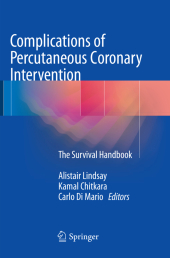 Neuerscheinungen 2018Stand: 2020-02-01 |
Schnellsuche
ISBN/Stichwort/Autor
|
Herderstraße 10
10625 Berlin
Tel.: 030 315 714 16
Fax 030 315 714 14
info@buchspektrum.de |

Kamal Chitkara, Carlo Di Mario, Alistair Lindsay
(Beteiligte)
Complications of Percutaneous Coronary Intervention
The Survival Handbook
Herausgegeben von Lindsay, Alistair; Chitkara, Kamal; Di Mario, Carlo
Softcover reprint of the original 1st ed. 2016. 2018. xiii, 310 S. 57 SW-Abb., 52 Farbabb., 29 Farbtabe
Verlag/Jahr: SPRINGER, BERLIN; SPRINGER, LONDON; SPRINGER 2018
ISBN: 1-447-17377-5 (1447173775)
Neue ISBN: 978-1-447-17377-9 (9781447173779)
Preis und Lieferzeit: Bitte klicken
This book serves as a reference manual for practicing cardiologists and a training guide for students, covering a variety of common and unusual, often life-threatening complications of percutaneous coronary intervention (PCI) that occur in day-to-day practice.
Complications of Percutaneous Coronary Intervention: The Survival Handbook aims to serve as a reference manual for all cardiologists, particularly those in training, who face life-threatening complications of PCI on a day-to-day basis. Drawing on the background and experience of cardiologists from both sides of the Atlantic, the book aims to be a valuable, practical, and most of all readable resource for the interventional cardiologist. The principles and practices described in the book will be of interest to all practitioners of interventional catheter procedures, including interventional radiologists, vascular surgeons, and cardiologists.Few medical procedures have evolved as dramatically or as quickly as percutaneous coronary intervention (PCI). From its initial conception, PCI has evolved to become a very complex procedure. Each year in the United States well over 1,000,000 percutaneous coronary intervention procedures are performed. However as the volume and complexity of the procedures being performed has increased, so has the potential for procedural error leading to life-threatening complications. Knowledge of what complications can occur during PCI and how to deal with them is vital for the practicing cardiologist, and can mean the difference between life and death.
Femoral pseudoaneurysm.- Superficial Femoral Artery Dissection.- Vagal reaction.- Unable to find femoral pulse.- Find radial pulse but actually blocked and stick ulnar.- Unable to find radial pulse.- Femoral dissection.- Femoral bleeds Radial injury, perforation, need for glue, etc.- Radial spasm.- Radial: Unable to negotiate aorta.- Unable to negotiate subclavian/aorta junction.- Unable to intubate left coronary system.- Unable to intubate right coronary.- Unable to Intubate grafts.- Unable to intubate LIMA.- Conus branch injection - VF.- Brachial injury - no flow.- Stroke on table.- Aortic Dissection - Subclavian dissection.- Left main stem pressure damping cf. ventriculisation.- Coronary air embolism.- Coronary rupture.- Distal wire perforation.- Lost stent/Stent embolization.- Wire breakage, trapping.- Acute dissection/vesssel closure.- Femoral haematoma.- Retro-peritoneal haemorrhage.- Stent fracture.- Acute pericardial effusion.- Left main stem dissection.- Unable to withdraw wire past newly inserted stent.- No-reflow phenomenon.- Unable to pass wire.- Unable to pass balloon.- Unable to pass stent.- Stented underprepared lesion.- Acute onset hypotension Chest pain.- Hypertension.- Pulmonary oedema on table.- Unable to cross aortic valve.- Pigtail or end hole punctures ventricle.- Sheared rotablator wire/retained tip.- Wire under stent.- Atheroembolism of leg.- Failed vascular closure device.- Intramural haematoma.- Failure of stent deployment.- Dissection after rotablation.- Wire fracture.- Perforated side branch needing coils.


